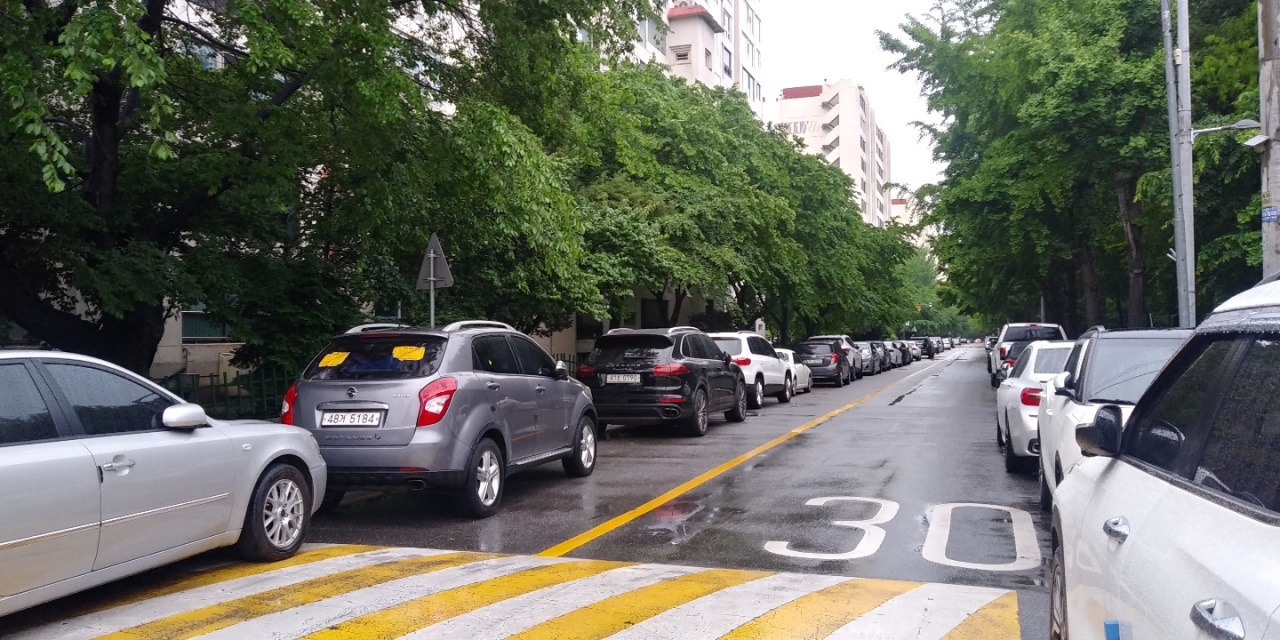[Seoul Struggles 8] Illegally parked cars wreak havoc for drivers in Seoul
Heavier fine and better use of parking space already in use could do the trick, experts say
By Ko Jun-taePublished : May 24, 2021 - 14:07

Paying fines for illegal parking has become a habit for Lee Hyeon-seok, a 34-year-old office worker based in Jung-gu, central Seoul, where finding a parking spot by his workplace is nearly impossible on most days.
Driving to and from his workplace, where designated parking space is not guaranteed, he spends most weekday mornings driving around every corner of the block trying to locate a spot that would be able to house his four-door sedan for eight hours.
He has cash waiting in his pocket waiting to pay for whatever space he finds. But on some days, he just can’t, eventually resorting to parking anywhere and taking the risk of paying the fine if a bill finds its way to his mailbox.
“I really try to live as a law-abiding citizen and a diligent employee who doesn’t come late to work, but if I can’t find a parking space in the morning, I have to give up on one of these two goals,” said Lee.
“I’m not a fan of illegal parking, and I’m sure most people feel the same way, but what other choice do I have when I just can’t find anywhere to park?”
Lee is certainly not the only one who has been parking illegally while driving around in Seoul. He and hundreds of thousands of other drivers frequently go rogue while parking.
According to city government data, more than 2.3 million illegal parking tickets were issued in Seoul last year, and over 500,000 were already issued in the first three months of this year.
Municipal regulations prohibit cars from being parked in places where public traffic access can be disrupted, and hundreds of parking lots are in operation. But illegal parking ensued nonetheless, leading to thousands of accidents every year.
Data from the Ministry of the Interior and Safety as of 2018 shows that an average of 10,785 traffic accidents and 758 casualties are reported each year in Seoul in connection to illegal parking.
Experts say the problem is especially great in densely populated areas of the city, as drivers feel entitled to pay nothing to park. Many still feel like paying for parking space is a waste of money, willing to take their chances of not getting caught while parking illegally.
“If nobody was looking, you would do the same thing, right?” said a 28-year-old car owner in Seongbuk-gu, northern Seoul, who wished to remain anonymous in fear of criticism for his comments.
“People won’t say it out loud, but we all know it. I mean, 3,000 won ($2.7) an hour isn’t expensive, but it still kind of aches to pay for it when you think you can get away with just parking anywhere else.”
Drivers in Seoul are more likely to take their chances than in other countries because the fines are lower, experts say, calling for the penalty to be more severe to deter the practice of illegal parking.
Since 1995, South Korea has imposed a fine of 40,000 won for illegal parking, with a 20 percent discount if paid early. Parking tickets in New York can easily cost more than $100, and in Japan, a parking ticket will set you back 12,000 yen ($110).
“The country overall has been lenient on illegal parking, as local governments fear opposition from residents and car owners to a crackdown,” said Kang Kyung-woo, a transportation and logistics engineering professor at Hanyang University.
“The public should be more receptive toward paying for parking, and raising the fine for violators could be a solution, but the measure should be proceeded while providing more parking space for people.”
Kang said simply adding the number of parking lots isn’t the solution to the persisting problem, as it would be impossible to build enough parking spaces to accommodate all cars in Seoul, adding it would also be economically inefficient.
There are a total of 3.16 million vehicles registered in Seoul, and on any given day of the week last year, more than 10 million vehicles moved in and out of the city. Seoul as a whole had parking space for more than 4.2 million cars across its precinct in 2020.
Experts like Kang suggest the city work with the private sector to allow more buildings and residential complexes to open up their parking lots to visitors in exchange for a fee to help drivers find more parking spaces in populous areas.
Lawmakers should also consider revising the legislation for newly constructed buildings to co-register parking spaces with other buildings, they add, which would help improve the quality and housing space for parking lots, especially in crowded areas like Myeong-dong or Gwanghwamun area.
The local law stipulates that newly constructed buildings must secure their own parking spaces for their users and visitors. The law has forced buildings to prepare rather small parking spaces in many cases, which could be fixed if building owners are allowed to jointly register parking spaces, they say.
“There needs to be an element of market principle involved in this,” said Yu Jeong-whon, a transportation systems engineering professor at Ajou University.
“If buildings are allowed to co-register parking lots in greater sizes, they will be prompted to construct bigger lots, and this will be able to meet the demand for cars visiting the area. Building owners would be able to profit from this and also start a healthy competition among them.”
By Ko Jun-tae (ko.juntae@heraldcorp.com)
Driving to and from his workplace, where designated parking space is not guaranteed, he spends most weekday mornings driving around every corner of the block trying to locate a spot that would be able to house his four-door sedan for eight hours.
He has cash waiting in his pocket waiting to pay for whatever space he finds. But on some days, he just can’t, eventually resorting to parking anywhere and taking the risk of paying the fine if a bill finds its way to his mailbox.
“I really try to live as a law-abiding citizen and a diligent employee who doesn’t come late to work, but if I can’t find a parking space in the morning, I have to give up on one of these two goals,” said Lee.
“I’m not a fan of illegal parking, and I’m sure most people feel the same way, but what other choice do I have when I just can’t find anywhere to park?”
Lee is certainly not the only one who has been parking illegally while driving around in Seoul. He and hundreds of thousands of other drivers frequently go rogue while parking.
According to city government data, more than 2.3 million illegal parking tickets were issued in Seoul last year, and over 500,000 were already issued in the first three months of this year.
Municipal regulations prohibit cars from being parked in places where public traffic access can be disrupted, and hundreds of parking lots are in operation. But illegal parking ensued nonetheless, leading to thousands of accidents every year.
Data from the Ministry of the Interior and Safety as of 2018 shows that an average of 10,785 traffic accidents and 758 casualties are reported each year in Seoul in connection to illegal parking.
Experts say the problem is especially great in densely populated areas of the city, as drivers feel entitled to pay nothing to park. Many still feel like paying for parking space is a waste of money, willing to take their chances of not getting caught while parking illegally.
“If nobody was looking, you would do the same thing, right?” said a 28-year-old car owner in Seongbuk-gu, northern Seoul, who wished to remain anonymous in fear of criticism for his comments.
“People won’t say it out loud, but we all know it. I mean, 3,000 won ($2.7) an hour isn’t expensive, but it still kind of aches to pay for it when you think you can get away with just parking anywhere else.”
Drivers in Seoul are more likely to take their chances than in other countries because the fines are lower, experts say, calling for the penalty to be more severe to deter the practice of illegal parking.
Since 1995, South Korea has imposed a fine of 40,000 won for illegal parking, with a 20 percent discount if paid early. Parking tickets in New York can easily cost more than $100, and in Japan, a parking ticket will set you back 12,000 yen ($110).
“The country overall has been lenient on illegal parking, as local governments fear opposition from residents and car owners to a crackdown,” said Kang Kyung-woo, a transportation and logistics engineering professor at Hanyang University.
“The public should be more receptive toward paying for parking, and raising the fine for violators could be a solution, but the measure should be proceeded while providing more parking space for people.”
Kang said simply adding the number of parking lots isn’t the solution to the persisting problem, as it would be impossible to build enough parking spaces to accommodate all cars in Seoul, adding it would also be economically inefficient.
There are a total of 3.16 million vehicles registered in Seoul, and on any given day of the week last year, more than 10 million vehicles moved in and out of the city. Seoul as a whole had parking space for more than 4.2 million cars across its precinct in 2020.
Experts like Kang suggest the city work with the private sector to allow more buildings and residential complexes to open up their parking lots to visitors in exchange for a fee to help drivers find more parking spaces in populous areas.
Lawmakers should also consider revising the legislation for newly constructed buildings to co-register parking spaces with other buildings, they add, which would help improve the quality and housing space for parking lots, especially in crowded areas like Myeong-dong or Gwanghwamun area.
The local law stipulates that newly constructed buildings must secure their own parking spaces for their users and visitors. The law has forced buildings to prepare rather small parking spaces in many cases, which could be fixed if building owners are allowed to jointly register parking spaces, they say.
“There needs to be an element of market principle involved in this,” said Yu Jeong-whon, a transportation systems engineering professor at Ajou University.
“If buildings are allowed to co-register parking lots in greater sizes, they will be prompted to construct bigger lots, and this will be able to meet the demand for cars visiting the area. Building owners would be able to profit from this and also start a healthy competition among them.”
By Ko Jun-tae (ko.juntae@heraldcorp.com)


![[AtoZ into Korean mind] Humor in Korea: Navigating the line between what's funny and not](http://res.heraldm.com/phpwas/restmb_idxmake.php?idx=644&simg=/content/image/2024/04/22/20240422050642_0.jpg&u=)


![[Herald Interview] Why Toss invited hackers to penetrate its system](http://res.heraldm.com/phpwas/restmb_idxmake.php?idx=644&simg=/content/image/2024/04/22/20240422050569_0.jpg&u=20240422150649)

![[Graphic News] 77% of young Koreans still financially dependent](http://res.heraldm.com/phpwas/restmb_idxmake.php?idx=644&simg=/content/image/2024/04/22/20240422050762_0.gif&u=)






![[Exclusive] Korean military to ban iPhones over security issues](http://res.heraldm.com/phpwas/restmb_idxmake.php?idx=652&simg=/content/image/2024/04/23/20240423050599_0.jpg&u=20240423171347)



![[Today’s K-pop] Ateez confirms US tour details](http://res.heraldm.com/phpwas/restmb_idxmake.php?idx=642&simg=/content/image/2024/04/23/20240423050700_0.jpg&u=)